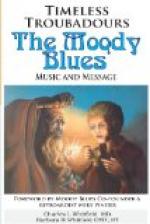Pus astres no
m’es donatz
Que de mi dons bes m’eschaia,
Ni nulho nos plazers no.l platz,
Ni ay poder que.m n’estraia,
Ops m’es qu’ieu sia fondatz
En via d’amor veraia,
E puesc n’apenre assatz
En Cataluenha la gaia,
[120]
Entrels Catalas valens
E las donas avinens.
Quar dompneys,
pretz e valors,
Joys e gratz e cortesia,
Sens e sabers et honors,
Bels parlars, bella paria,
E largueza et amors,
Conoyssensa e cundia,
Troban manten e socors
En Cataluenha a tria,
Entrels, etc.
“Since my star has not granted me that from my lady happiness should fall to me, since no pleasure that I can give pleases her and I have no power to forget her, I must needs enter upon the road of true love and I can learn it well enough in gay Catalonia among the Catalonians, men of worth, and their kindly ladies. For courtesy, worth, joy, gratitude and gallantry, sense, knowledge, honour, fair speech, fair company, liberality and love, learning and grace find maintenance and support in Catalonia entirely.”
Between thirty and forty poets of Spanish extraction are known to have written Provencal poetry. Guillem de Tudela of Navarre wrote the first part of the Chanson de la Croisade albigeoise; Serveri de Gerona wrote didactic and devotional poetry, showing at least ingenuity of technique; Amanieu des Escas has left love letters and didactic works for the [121] instruction of young people in the rules of polite behaviour. But the influence of Provencal upon the native poetry of Spain proper was but small, in spite of the welcome which the troubadours found at the courts of Castile, Aragon, Leon and Navarre. Troubadour poetry required a peaceful and an aristocratic environment, and the former at least of these conditions was not provided by the later years of Alfonso X. Northern French influence was also strong: numerous French immigrants were able to settle in towns newly founded or taken from the Moors. The warlike and adventurous spirit of Northern and Central Spain preferred epic to lyric poetry: and the outcome was the cantar de gesta and the romance, the lyrico-narrative or ballad poem.
This was not the course of development followed either in the Eastern or Western coasts of the peninsula. Catalonia was as much a part of the Provencal district as of Spain. To the end of the thirteenth century Catalonian poets continued to write in the language of the troubadours, often breaking the strict rules of rime correspondence and of grammar, but refusing to use their native dialect. Religious poems of popular and native origin appear to have existed, but even the growth of a native prose was unable to overcome the preference for Provencal in the [122] composition of lyrics. Guiraut de Cabreira is remembered for the 213 lines which he wrote to




